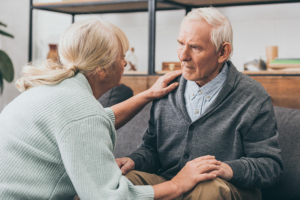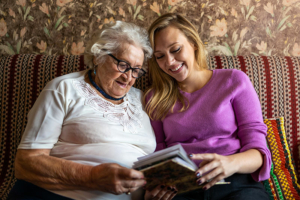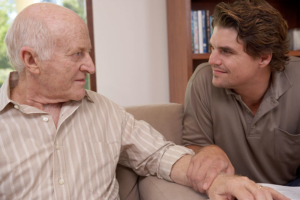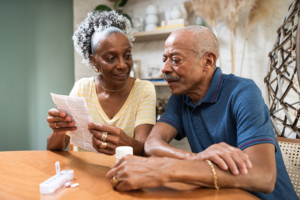Bridging the Gap in Dementia Care: Using Food to Engage and Connect

Learn how food can help you engage and connect as you provide dementia care.
Food is a universal language, and it connects us all! Think about how many cherished memories have been made through the years that incorporated food at the center of them all: birthday parties, wedding celebrations, holiday meals. Even average days involve routines that become ingrained in us around food, from that first aromatic cup of coffee in the morning to a shared bowl of buttery popcorn with family while watching a movie.
Of course, food isn’t just needed for our physical health, but it is also often a highly effective way to connect with someone with dementia while delivering dementia care. Here are several activities you can try to help spark memories while appealing to all the senses through food.
- Preparing. Choose a simple recipe to prepare, like fruit salad or sandwiches. Assemble the ingredients and incorporate them into your conversation. While washing and cutting up fruit, for instance, ask the senior what kinds of fruits they enjoyed as a kid.
- Decorating. Frost cupcakes while reminiscing about the treats Mom would prepare for school birthday parties. Roll out cookie dough and use cookie cutters and sprinkles to make them specific to an upcoming holiday while you discuss holidays past.
- Storytelling. Take out a vintage cookbook and look through the recipes together to see if any spark memories. The senior may remember food rationing during wartime, or the time they tried a new recipe at the beginning of their marriage that was a total disaster. If a specific recipe is of interest, make it together!
Consider how you can involve the senses into mealtimes as you deliver dementia care. There is so much more to food than taste! Point out the sizzling sound of eggs frying, delicious scent of the chicken you are roasting for dinner, the cool smoothness of bread dough being kneaded. Attempt to make each plate served appetizing to the eyes as well as the palate. And whenever possible, cultivate conversations that link the person to memories from the past.
Quite often, a person with dementia will encounter a diminished appetite and lose interest in food. Activities such as these can be a terrific way to restore the joy we experience together through shared meals and treats.
Our dementia care experts have lots more tips to make life the best it can be for someone with dementia. Get in touch with Responsive Home Care any time online or at (954) 486-6440 to request dementia care resources or to find out more about our home health care services in Fort Lauderdale, FL and the nearby areas.

 Everyone goes through good days and bad days, and everyone is entitled to negative thinking or irritability every now and then. If you are caring for an older adult who appears to have fallen into a routine of continual negativity and complaining, there could be a reason for it. It’s worthwhile to explore whether or not a health issue may be the culprit for negative mood changes in a senior.
Everyone goes through good days and bad days, and everyone is entitled to negative thinking or irritability every now and then. If you are caring for an older adult who appears to have fallen into a routine of continual negativity and complaining, there could be a reason for it. It’s worthwhile to explore whether or not a health issue may be the culprit for negative mood changes in a senior.






 If it feels like a senior with
If it feels like a senior with  Disorientation. Confusion. Memory loss. While these are definitely hallmark warning signs of
Disorientation. Confusion. Memory loss. While these are definitely hallmark warning signs of  Distress. Fear. Embarrassment. The thoughts and feelings surrounding a potential Alzheimer’s diagnosis may cause older adults to keep their suspicions to themselves. A recently available
Distress. Fear. Embarrassment. The thoughts and feelings surrounding a potential Alzheimer’s diagnosis may cause older adults to keep their suspicions to themselves. A recently available